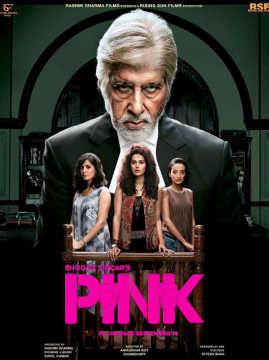In Pink: The Inside Story, author Gautam Chintamani takes readers through the whole process of how the National Award-winning film Pink came together, piece by piece.
Book excerpt: How the dialogue ‘No means no’ from Pink took shape
Mumbai - 07 Nov 2017 11:50 IST
Updated : 08 Nov 2017 10:58 IST


Our Correspondent
Gautam Chintamani’s book, Pink: The Inside Story, is out after a year since the film released on 16 September 2016. Star Amitabh Bachchan has written the foreword, while producer Shoojit Sircar has written the afterword. The entire script of the National Award-winning film is available to peruse in the book.
But before that, Chintamani goes through how the film was formed —– from idea to script to shooting the feature in Delhi last year. The cast and crew detail how scenes were created and characters came to life onscreen. One pivotal moment in Pink featured Bachchan, in his imposing baritone, talking about consent, emphasising on the word ‘No’ and how that should be enough.
In the excerpt below, Chintamani writes how the important line was almost left out of the film and writer Ritesh Shah’s instinct to include it in.

Excerpt follows:
One of the major reasons for such a catharsis for the characters as well as the actors portraying them could be Deepak Sehgal’s final lines that not only summed up the case but also the film. It is this portion that contains the line, ‘No means no’, which became the simple yet effective message that would eventually resonate with the audiences. The line, however, nearly did not make it to the film. Once the long ‘interrogation’ scene with Taapsee Pannu was filmed, Amitabh Bachchan felt no need to make a long speech for his closing statements. Shah remembers the actor telling him, ‘Bhai, sab kuch to main bol chuka hoon (I have already said everything). He said, “I will just say 'No' and sit down.” This was also the draft with which the crew went to shoot the scene, but Shah had something else in mind. ‘Someone had sent me an image on Facebook of a coffee mug that had the line “No is a complete sentence” written on it,’ says Shah. Intrigued by it, he remembers saving the image on his mobile phone. As the climax of the courtroom was approaching, Shah visited the set and, mentioning the image, told Sircar, Roy Chowdhury and Bachchan that he wanted to write six or eight lines around the theme. ‘The only concern that Mr Bachchan had was whether the lines would be as effective in Hindi but I said let me try,’ says Shah. Both Sircar and Roy Chowdhury liked the lines that Shah had written and even Bachchan agreed that it made sense to say them. ‘Being the gracious actor that he is, Mr Bachchan never said, “I won’t say it because I had decided that main nahin boloonga...”, says Shah and adds, ‘Sometimes things happen by pure chance and the desire for expression.’
Shah has since thanked many people for sending him the image that inspired him, including writer Anuradha Tiwari, but no one has claimed ownership of the line yet. For Sircar, this was the dialogue that packed it all in and he was happy to see the reaction that came his way from the lawyers that he consulted. ‘They said, “Yaar, bol do! Hum thak gaye bol bol ke (Just say it! We are tired of saying it again and again).”

This is also where, for Roy Choudhury, Bachchan’s prowess as an actor and a star made itself most strongly. Roy Chowdhury credits him for breaking down the concept of consent to its simplest form for the benefit of male viewers, most of whom, unfortunately, do not comprehend it. Some critics and commentators would later question the way in which the film addressed consent but Roy Chowdhury remembers how some of his friends’ children, specifically boys, called him up to say that they learnt something. ‘I knew people would love it,’ says Roy Chowdhury and reiterates ‘we shouldn’t deny that words like “Na sirf ek shabd nahi, apne aap mein ek poora vakya hai (no is not just a word, but a full sentence in and of itself)” can spread like wildfire when someone like Mr Bachchan delivers it.’
Thinking back to the way in which the ‘No means no’ dialogue came about, Ritesh Shah also feels that as a society sometimes we are ready for a certain kind of film regardless of the scenario. The thought acted as one of the guiding principles in making Pink, especially when it came to writing the judgement.
This excerpt is reproduced with permission from Harper Collins India.




